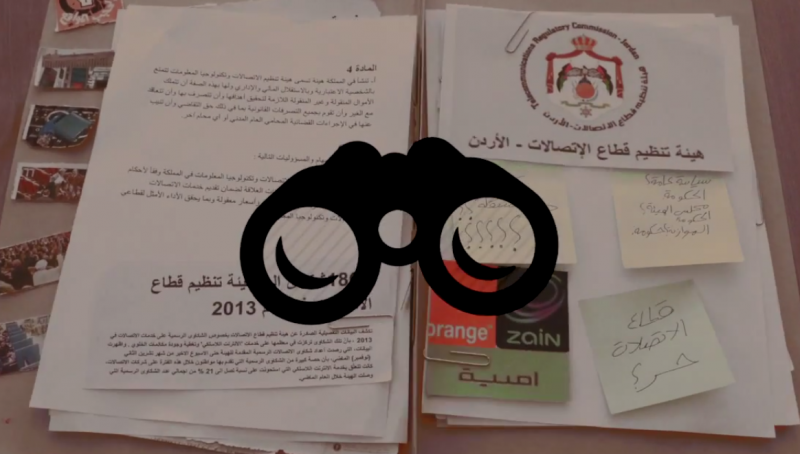
Scree capture from telecom law explainer video by 7iber, used with permission.
The original version of this post was published on 7iber's LaSilkee (wireless) blog.
Over the past two years, Jordan has passed a series of laws that stifle rights to free expression and access to information and undermine government goals of making Jordan a regional hub for the startups and the ICT industry. While updates to the Press and Publication Law in 2012 weren’t the country's first legal restrictions on online speech, they have presented an immediate threat to the open internet and human rights. The amended law now requires the licensing of electronic websites that “publish content about Jordan”, and leaves editors-in-chief legally liable for posted comments. This led to the blocking of 300 websites in June of last year. In May 2014, authorities passed a new Anti-Terrorism Law that incriminates any act of digital expression that appears to voice support for “terrorist groups”, but offers no clear definitions of what constitutes “support” and “terrorism”.
The latest addition to this limiting legislative framework is a series of proposed amendments to the Telecommunications Law, currently waiting to be discussed by Parliament.
If passed, the amendments could have a multilayer impact on the user experience and digital creative industries. The draft Telecommunications Law orders telecom companies to centrally block online pornographic content, despite “safe” (end-user filtering) Internet service packages that these providers offer. Centralizing online filtering could endow the government with a sort of “moral custodianship” over Jordanian Internet users, telling them what content they should or should not access. The decision could also affect access to perfectly legal content such as educational websites that discuss human anatomy or sex education, both topics that are difficult to learn about in Jordan, but for the Internet.
The law would also leave the Telecommunication Regulatory Commission in charge of issuing blocking orders against any “violating” content. In a country that already practices censorship over print publications and movies for “immoral” and “unethical” references that violate “public code”, the definition of “violating content” is destined to be subject to the administrative interpretation of the Commission. To add insult to injury, the proposed amendments require telecom companies to suspend an individual's Internet service if she should find her way to what is considered “immoral” content. ISPs will face penalties if they do not comply with orders to suspend individuals’ service.
The amendments allow “specialized authorities” to obtain access to users’ information with a court order. While a court order for obtaining information may sound compatible with protecting the right to privacy, in Jordan many executive entities have judicial authority and can thus issue warrants, including the intelligence, the governor, and the police department.
To say that accountability has not been duly accounted for in the draft law is an understatement. The law grants the Telecommunication Regulatory Commission the right to prosecute and issue penalties to violators but also gives the Commission the legislative authority to develop regulations and determine penalties for violations. This is a major violation of the constitutional principle of governance: Separation of the legislative and judicial authorities. To make matters worse, revenue from penalties are funneled into the Commission's budget. The law also confuses governance by expanding the jurisdiction of the TRC to regulating visual and audio content, which already has its own regulatory framework and entity in the country.
The law is currently awaiting approval in the Legislative and Opinion Bureau to reach legal formulation. According to the customary lifecycle of law formulation, the Legislative and Opinion Bureau accepted citizens’ comments on the draft until May 8 to take into consideration before returning it to the cabinet, which in turn submits it to both houses of Parliament.
7iber produced the following video to explain how the amendments affect the Jordanian user. In Arabic, with English subtitles.




2 comments